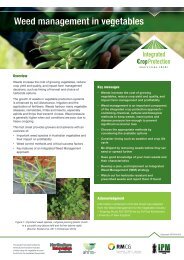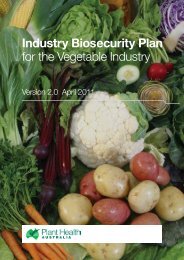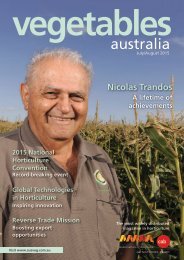vegetables
VA-NovDec2015
VA-NovDec2015
Create successful ePaper yourself
Turn your PDF publications into a flip-book with our unique Google optimized e-Paper software.
Sustainable<br />
Farming<br />
33<br />
Focus<br />
Regional treatment<br />
planning with IPM<br />
PESTS AND DISEASES IN AUSTRALIA ARE<br />
DEALT WITH DIFFERENTLY, DEPENDING<br />
ON THE REGIONAL TOOLS AVAILABLE<br />
TO VEGETABLE GROWERS. IN THIS<br />
ARTICLE, CHRIS MONSOUR FROM<br />
PERACTO DISCUSSES THE SUCCESSFUL<br />
IMPLEMENTATION OF INTEGRATED PEST<br />
MANAGEMENT (IPM) PROGRAMS IN THE<br />
REGION, WHILE DR PAUL HORNE FROM<br />
IPM TECHNOLOGIES EXPLAINS THE NEED<br />
FOR CONTINUED COLLABORATION TO<br />
DEVELOP GROWER RESOURCES.<br />
Within the different growing<br />
regions of Australia,<br />
major pest and disease issues<br />
change with corresponding<br />
environmental differences.<br />
The tools available for growers<br />
to deal with these issues have<br />
been expanded through the<br />
development of beneficial<br />
insects or Integrated Pest<br />
Management (IPM) techniques.<br />
According to Chris Monsour<br />
from Peracto, IPM is being<br />
successfully implemented in<br />
north Queensland to combat the<br />
impact of two major insect pests<br />
of vegetable crops in the Bowen<br />
and Burdekin production areas.<br />
“Silverleaf whitefly (SLWF)<br />
and Green peach aphid (GPA)<br />
are major pests of tomato,<br />
capsicum and cucurbit crops in<br />
the region,” Mr Monsour said.<br />
“Both pests have a direct<br />
impact on the health of these<br />
crops via feeding damage<br />
and both are vectors of very<br />
debilitating plant viruses. SLWF<br />
is the vector of Tomato yellow<br />
leaf curl virus (TYLCV) and GPA<br />
has in recent years been shown<br />
to vector Potato leaf roll virus<br />
(PLRV).”<br />
The planning and systems<br />
involved for these programs are<br />
well developed for the grower<br />
to be able to easily implement<br />
them.<br />
“This season has seen the<br />
successful implementation of<br />
IPM programs incorporating<br />
regular crop monitoring,<br />
strategic use of chemical<br />
insecticides, inundative<br />
releases of beneficial insects,<br />
use of resistant varieties,<br />
good farm hygiene and farm<br />
planning,” Mr Monsour said.<br />
“The availability of new<br />
generation ‘soft’ insecticides are<br />
highly effective against sucking<br />
pests such as SLWF and GPA,<br />
alongside releases of the<br />
parasitoid wasps Eretmocerus<br />
hyati for SLWF and Aphidius<br />
colemani for GPA, which have<br />
been highly effective in enabling<br />
growers to manage these two<br />
highly damaging pests during<br />
the current season.”<br />
Quality in collaboration<br />
Dr Paul Horne is an<br />
Entomologist and Director of<br />
IPM Technologies, which has<br />
been showing farmers how to<br />
control pests with minimal use<br />
of insecticides in situations<br />
such as those in Bowen and the<br />
Burdekin for 20 years.<br />
In the last year, South<br />
Australian growers have also<br />
found support from a global<br />
chemical company (Bayer<br />
CropScience) and a chemical<br />
reseller (DJ’s Growers in SA).<br />
Dr Horne said there are several<br />
reasons for the collaboration.<br />
“Firstly, correct use of<br />
the newer, more selective<br />
insecticides such as BELT®<br />
and MOVENTO® will mean that<br />
the development of insecticide<br />
resistance can be greatly<br />
reduced. Secondly, selling<br />
farmers the correct products<br />
that are compatible with an IPM<br />
approach will give them better<br />
control of pests. Providing good<br />
advice rather than simply a<br />
product is important.”<br />
The outputs of this project will<br />
benefit growers in this region,<br />
and ultimately the vegetable<br />
industry as a whole through<br />
developing the resources<br />
available to growers.<br />
“So far this collaboration<br />
has meant running a training<br />
workshop for seed potato<br />
growers on Kangaroo Island in<br />
conjunction with DJ’s and also<br />
explaining IPM to several groups<br />
of growers at seminars in the<br />
Adelaide Hills,” Dr Horne said.<br />
“In this coming season, the<br />
Kangaroo Island growers will<br />
have access to specialist IPM<br />
advice whenever it is required.”





